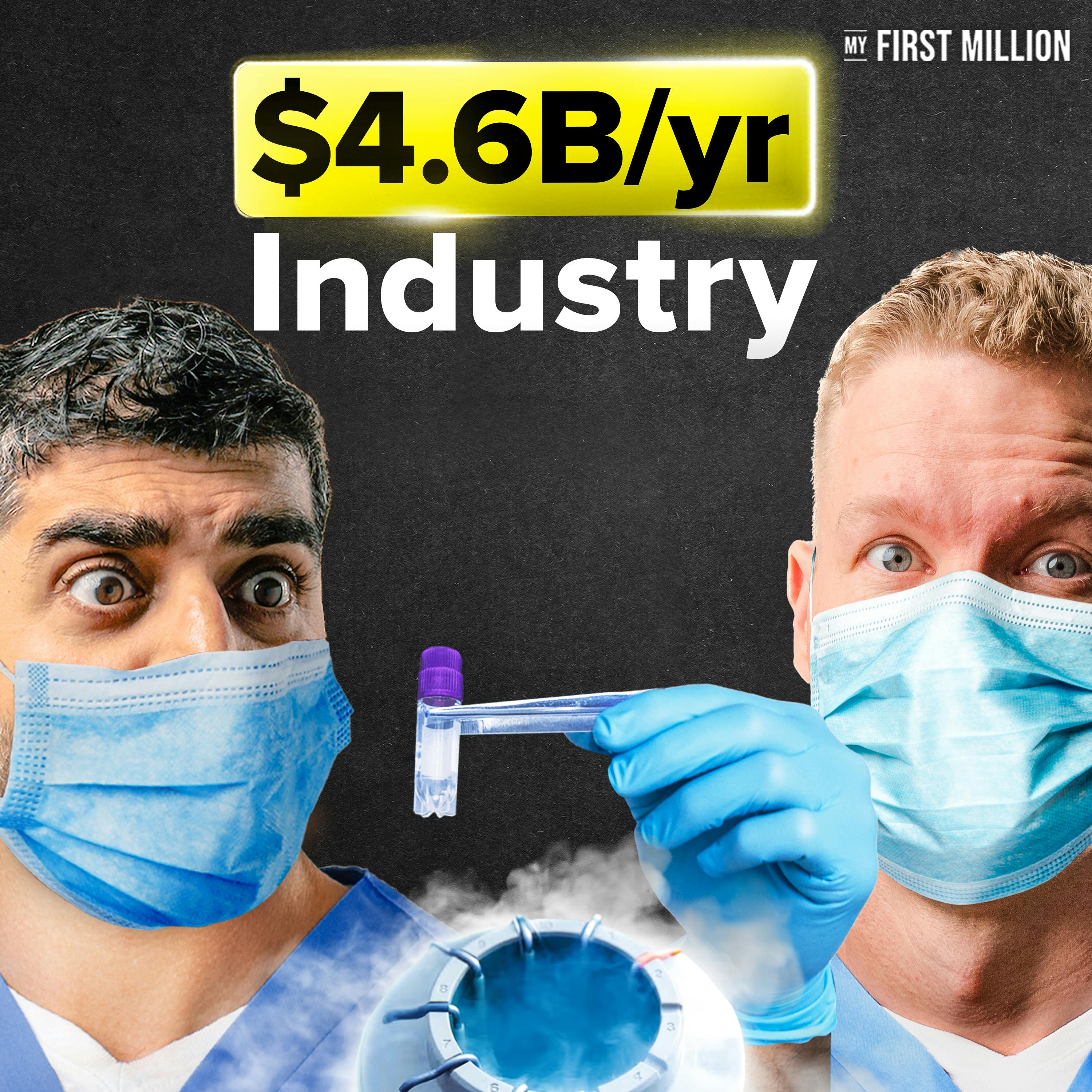
March 25, 2024 • 44min
It’s The Most Taboo Business Model We’ve Ever Seen
My First Million
In this wide-ranging conversation, the hosts discuss various topics related to parenting, fertility, content creation, and entrepreneurship. They analyze the business models and marketing tactics behind several successful influencers and brands.

It’s The Most Taboo Business Model We’ve Ever Seen
0:00
-0:00
Key Takeaways
- A startup called Co-Fertility is offering free egg freezing in exchange for egg donation, bundling two services together in a potentially disruptive business model.
- Parenting influencers like "Dr. Becky" have successfully monetized their expertise by building trust with free content, then selling info products and memberships to their audience.
- Entrepreneurs should focus their talents on pursuing the biggest opportunities, rather than achieving perfection on a small scale. It's important to know when to quit middling projects.
- Effective content marketing involves understanding your target audience's interests and hangouts, and creating content that organically generates engagement and desire for your product.
Introduction
In this wide-ranging conversation, the hosts discuss various topics related to parenting, fertility, content creation, and entrepreneurship. They analyze the business models and marketing tactics behind several successful influencers and brands.
Topics Discussed
Co-Fertility's Innovative Approach to Egg Freezing (1:22)
- Co-Fertility is a startup offering free egg freezing to women in exchange for donating half of the eggs retrieved
- This bundling of services makes egg freezing accessible to those who couldn't otherwise afford the $10K+ price tag per cycle
- On the backend, Co-Fertility charges prospective parents $13-14K for matching with a donor egg, covering the costs of the free freezing
- The hosts debated the ethics of this model, with comparisons made to a friend who found a sperm donor within their social circle to have a child
- While controversial, Co-Fertility's approach may appeal to those who highly value egg freezing but have limited funds, if they're open to donating eggs
The Rise of Parenting Influencer "Dr. Becky" (15:35)
- Dr. Becky Kennedy is a clinical psychologist specializing in parenting, who has built a large following on Instagram
- She launched a business called Good Inside in 2020, a membership community charging $300/year for parenting advice and access to expert clinicians
- Good Inside has around 50K paying members, estimated to be generating $13-15M in annual revenue
- Dr. Becky partners with Erica Belsky, wife of entrepreneur Scott Belsky, and they've raised $10M in funding for the business
- While Dr. Becky's content appears authentic and effortless, the hosts speculate there is a calculated strategy driving her popularity and business
Monetizing Expertise Through Trust-Building Content (26:58)
- Many influencers and experts follow a similar playbook to monetize their knowledge:
- Create free content on social media, blogs, podcasts to build trust and authority
- Launch a paid community membership for access to more content/advice, often $200-300/year
- Sell info products like courses for $1K-2K as a higher tier
- Other examples following this model:
- Andrew Huberman in health/neuroscience
- Mark Sisson's health company Primal Blueprint
- Miss Excel teaching Microsoft Excel
- "Taking Cara Babies" sleep training courses
- "Big Little Feelings" parenting advice
- While the model is now well-known, finding a unique niche and executing well can still lead to significant success
VShred's Mega-Successful Fitness Marketing Funnel (29:22)
- VShred is a massively popular fitness brand that has reportedly generated $200M+ in revenue through savvy digital marketing
- Their marketing centers around a quiz funnel:
- Targeted Facebook ads direct people to a quiz
- Quiz asks about fitness goals, challenges, etc.
- Personalized product recommendation at end
- Testimonials and before/after photos build desire
- Call-to-action: "Do you want this result? Buy now"
- While aggressive, VShred's marketing is highly effective at making sales through push-button simplicity and powerful emotional triggers
Pivoting to Bigger Opportunities: Mini-Katana to Candy (30:41)
- Isaac, an e-commerce entrepreneur, initially found success selling miniature katana swords online through viral social media content
- His sword brand hit $10-20M in annual revenue with little paid marketing, as the product lent itself to highly engaging video content
- However, the sword market was ultimately too niche with limited repeat purchase behavior
- Isaac pivoted to launching a freeze-dried candy brand called Kpop Foods, applying his content marketing playbook to a much larger market opportunity
- His viral videos often featured swords in unexpected ways without directly promoting them, sparking organic conversation
- This highlights the importance of applying skills to the biggest opportunities, not just optimizing within a limited niche
The Art of Strategic Quitting (38:12)
- One host shared advice that it's better to be a talented entrepreneur pursuing a 10/10 opportunity, than achieving 10/10 execution on a 2/10 opportunity
- He emphasized the importance of quitting "middle zone" projects that aren't total failures, but aren't wildly successful either
- For example, he quit a venture fund that paid well but didn't match his best investment opportunities, in order to focus on bigger wins
- Quitting things that are "good but not great" is emotionally difficult, but frees up energy and attention for more impactful projects
Conclusion
This episode highlighted many examples of entrepreneurs and influencers creatively monetizing their skills and knowledge. Key themes included:
- Using free content to build trust, then charging for access and info products
- Understanding one's audience and creating content that resonates with their interests
- Packaging services together in unconventional ways to make premium offerings accessible
- Continually pursuing bigger opportunities and markets, rather than optimizing a small niche
- Strategically quitting "good but not great" projects to focus on the highest-potential areas
As online business models evolve, the core principles of providing value, understanding one's audience, and focusing on the most impactful opportunities remain key to success. While tactics may change, entrepreneurs who internalize these lessons will be well-positioned to make their mark.
